Hi, I’m Charles Davis, a seasoned guitarist, and I’ll take a wild guess here: chances are, you’ve never considered a 1/4 size guitar to be your go-to instrument. Tiny, toy-like perhaps – that’s probably how most people see them. But here’s the shocker:
These pint-sized guitars are not merely for kids or beginners – they can be a game-changer for seasoned musicians, travelers, or anyone looking to revamp their playing style.
I too was skeptical until I came across a 1/4 size classic. Its rich tone, the delicate balance between the trebles and the bass, it was enlightening. Now, this might sound controversial, but dare I say, this small guitar had an edge over a full-sized one. But how?
Hold that thought, as I take you through the nitty-gritty of 1/4 size guitars, comparing them with other types, examining their suitability for different users. It’s time these small wonders received the recognition they deserve. Welcome aboard on this journey into the incredible world of 1/4 size guitars.
What is a 1/4 Size Guitar
Comparison with Other Guitars
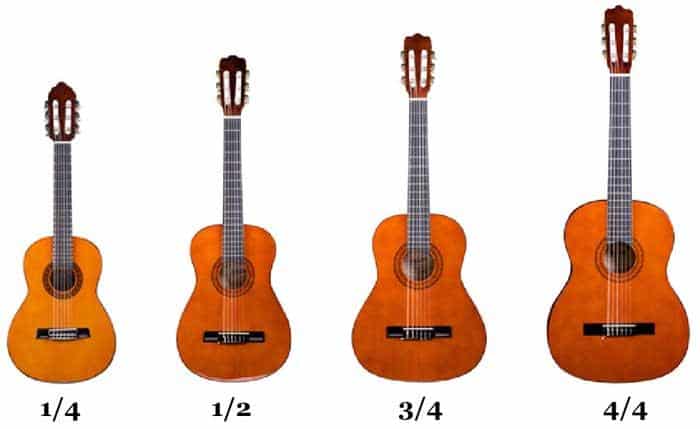
As an experienced musician and tutor, I’ve studied the intricacies of different types of guitars. To fully appreciate the 1/4 size guitar, it’s pivotal to contrast it with its peers: the junior guitar, children’s guitar, and student guitar.
Junior guitars are typically larger than a 1/4 size guitar, offering fuller sound but posing challenges for younger learners due to their size. In comparison, children’s guitars, while similar in dimensions, often sacrifice quality, designed more as toys than genuine instruments.
The student guitar category is broad and varies significantly in size. A 1/4 size guitar wins on portability, a crucial factor for children just stepping into their musical journey. However, the full-bodied sound that larger student guitars offer is something a 1/4 size guitar may not match.
All in all, the 1/4 size guitar holds its own as a purposefully designed, high-quality, and particularly travel-friendly instrument. Remember, the right guitar is the one that motivates the learner to play and improve. Be it home, studio or vacation, a 1/4 size guitar can be a versatile choice for the budding musician.
Types of 1/4 Size Guitars
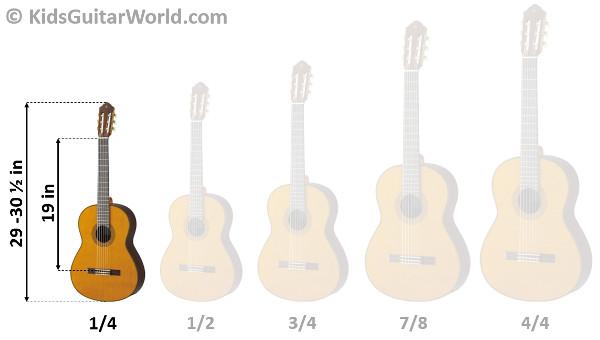
Diving deeper into the realm of 1/4 size guitars, we discover a variety of them uniquely designed to meet diverse musical needs. Based on my years of reviewing, two predominant types are the acoustic and classical guitars. The acoustic guitar has a distinct, resonating sound making it suitable for many musical genres. It’s best for the learner who is eager to experiment with a variety of sounds.
The classical guitar, commonly strung with nylon, produces a warm, smooth tone conducive to classical music and folk genres. This is ideal for a more focused learner, the one drawn to subtle textural richness. Interestingly, the nylon string guitar is synonymously used to mean classical guitar due to the signature use of nylon strings. This soft material reduces stress on the fingers, a valuable feature for beginners.
Exploring these types of 1/4 size guitars, each with unique features and sound profiles, you’re better equipped to choose the right one for your musical journey. The next section will delve into the specific groups of musicians who can benefit the most from these smaller sized guitars.
Who Can Benefit from a 1/4 Size Guitar
Child Learners
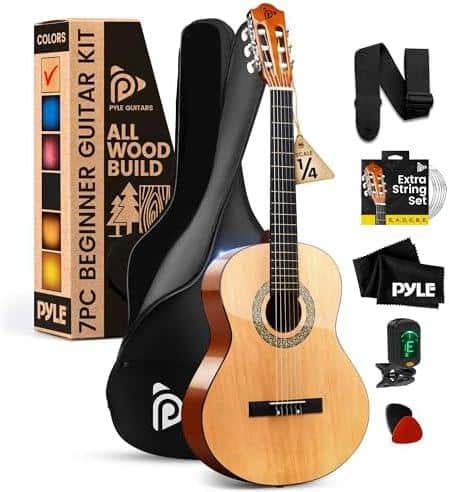
Moving onto those who can notably reap benefits from a 1/4 size guitar, child learners hold a prominent place. Children’s guitars, especially 1/4 size ones, align perfectly with their smaller hands and bodies. Having seen youngsters start their musical journey, I find such kid-sized guitars provide a much more comfortable and enjoyable learning experience for them.
These guitars not only fit in their hands easily but also enable better maneuvering of the fretboard. Starting with a guitar too large can be cumbersome, deterring them from continuing. With a kid-sized guitar, children can easily reach, hold down the strings, and strum without strain. The result is a significant boost in their confidence and enthusiasm, fostering their commitment to learning.
As we journey further into this guide, we will explore how these advantages not only apply to young learners but also to beginners and travel musicians, thus demonstrating the 1/4 size guitar’s extensive suitability.
Beginners
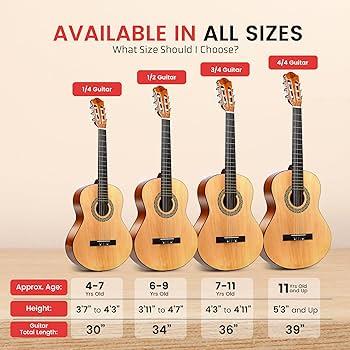
As an author well-versed in the world of guitars, I can confidently say that beginners greatly benefit from a 1/4 size guitar. Starting on this smaller, more manageable instrument allows for immediate focus on technique and melody, rather than struggling with size and weight. Moreover, a beginner guitar of this size eliminates intimidation, fostering a positive initial experience.
The 1/4 size guitar can be an excellent entry-level guitar due to its agreeable price point and ease of use. It offers a comfortable transitioning tool when scales and chords are new territory, letting beginners progress at their own pace. Consequently, the 1/4 size guitar plays a vital role in building a solid foundation in your guitar journey.
Moving forward, we will examine how the compactness of 1/4 size guitars appeals to traveling musicians, further expanding on who can extract the greatest value from these impressive, yet undersized, musical instruments.
Travel Musicians
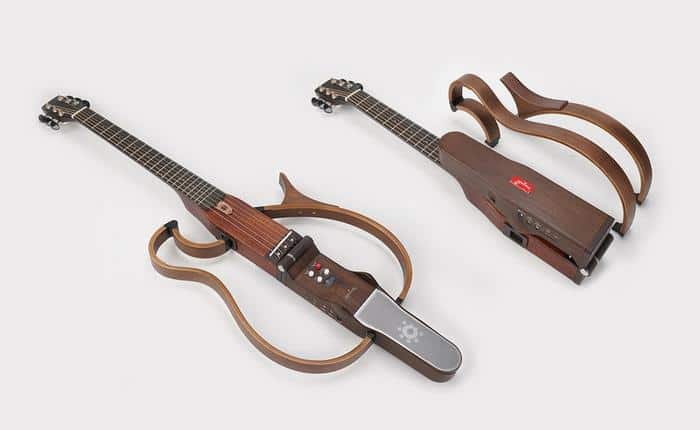
While advancing on the ‘Who Can Benefit from a 1/4 Size Guitar’ chapter, it’s essential to highlight the relevance of travel musicians in this context. As a traveling musician, I firmly vouch for the importance of 1/4 size or 30-inch guitars. Cozy and compact, a travel guitar can effortlessly adjust into backpacks or overhead cabin compartments, making it a boon for globetrotting artists. Playing on a 1/4 size guitar can also help in refining plucking and fretting skills, as you navigate the condensed fretboard. Moreover, despite its petite structure, this guitar doesn’t compromise on tonal quality, staying true to the essence of authentic music. It’s capacity to make music mobile is a testament to its significance for touring artists like us, allowing an on-the-go music creation, rehearsing, and performance.
Remember to refer back to these insights as we next descend into exploring further the types of 1/4 size guitars, their suitability, FAQs, and ultimately leading us to the conclusion of our comprehensive guide.
FAQs
What is a 1/4 size guitar?
A 1/4 size guitar, also known as a quarter size guitar, is the smallest standard size for guitars. It is typically 30-31 inches in length and is perfect for young children aged 4-6 years old, or for individuals with small hands and shorter reach.
How does a 1/4 size guitar compare to other kinds of guitars?
Compared to other kinds of guitars, 1/4 size guitars are smaller and lighter, making them easier for young children or individuals with small stature to hold and play. However, because of their size, they produce a quieter sound and have less range than larger guitars.
Who is a 1/4 size guitar suitable for?
A 1/4 size guitar is most suitable for young children aged between 4-6 years old, individuals with smaller hands, or beginners who find full-sized guitars too large or heavy to handle comfortably. It provides an excellent starting point for people to develop their playing technique and build confidence before transitioning to larger instruments as they grow.
Conclusion
Ever thought you’d be thinking so deeply about small guitars? Let’s sum up what we’ve learned. From my journey in guitar, I’ve found that 1/4 size guitars pack a punch despite their petite stature. Their compact design is highly suitable, especially for child learners, beginners, or the traveling musician. These guitars not only offer a smoother learning curve for novices, but their portability makes for a perfect companion on your journeys.
When we compared these with other guitar types, their unique qualities stood out even more. Hence, regardless of the variety of 1/4 size guitars available, their common feature remains: the simplicity of usage and adaptability to different situations. Deciding on a specific model best fitting your needs can be a personal journey, just as it was for me.
In this exploration, we debunked myths, dispelled doubts and, most importantly, developed a deep appreciation for these powerful little instruments. But remember, your guitar is as good as your passion for music. So, be it a child, a beginner, or a traveling musician, if you resonate with the melody, a 1/4 size guitar could strike the perfect chord in your musical journey.